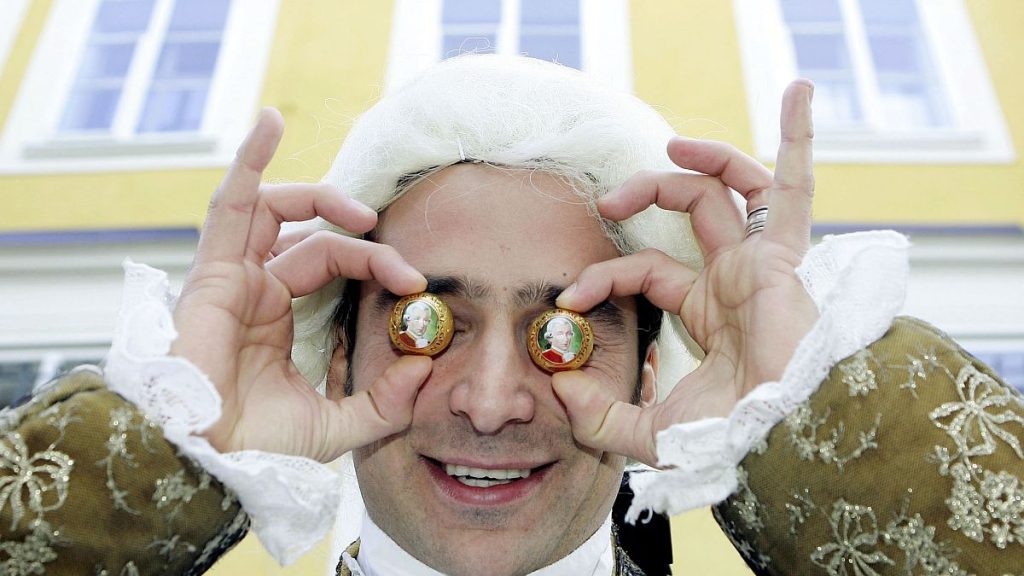The sweet symphony of Mozartkugeln production in Salzburg has reached its final, bittersweet crescendo. These iconic confections, affectionately dubbed “Mozart Balls,” have been a hallmark of the Austrian city’s culinary landscape for over a century, their dark chocolate shell encasing a harmonious blend of pistachio, marzipan, and nougat. The recent closure of the Grödig factory, the birthplace of these delectable treats, marks the end of an era and leaves a void in Salzburg’s confectionery heritage. The factory’s cessation of production not only silences the hum of machinery but also signals the loss of 65 jobs and an annual output of 57 million Mozartkugeln. This closure resonates as a poignant reminder of the fragility of even the most cherished traditions in the face of economic pressures.
The story of Mozartkugeln began in 1890, almost a century after the death of the musical genius whose name they bear. Confectioner Paul Fürst, the original maestro of these chocolate spheres, established a small factory in Salzburg, later relocating to the more spacious Grödig facility in 1948. For decades, the Grödig factory churned out these iconic sweets, solidifying their reputation as an authentic Salzburg delicacy, officially recognized as “Echte Salzburg Mozartkugeln” or “Real Salzburg Mozart Balls.” This designation marked them as distinct and superior, a testament to their unique recipe and production process. The factory’s closure, therefore, represents not just the end of a production line but the severing of a direct link to the confection’s historical roots.
The demise of Salzburg Schokolade, the company behind these beloved treats, came in the wake of mounting financial challenges. The company cited the escalating costs of cocoa, exacerbated by the ripple effects of the COVID-19 pandemic, as the primary culprits behind their financial woes. Having initially filed for insolvency in 2021, the company ultimately succumbed to the pressures in 2024, forcing the closure of the Grödig factory. While the machinery used in the production of Mozartkugeln has reportedly been sold to companies in Egypt and Mauritius, the future of the iconic confection remains uncertain. Mondelez International, the American food giant that acquired Salzburg Schokolade in 1975, has yet to reveal its plans for the Mozartkugeln brand, leaving a cloud of ambiguity hanging over its future.
What remains certain is that the production of Mozartkugeln within Austria has ceased, marking a significant shift in the confection’s history. Mondelez Austria has assured consumers that they are diligently working to ensure the continued production of Mirabell products, another confectionery brand under their umbrella. They have indicated that a solution has been found within their European network, suggesting a potential shift in production to facilities in Poland or the Czech Republic. This relocation, however, raises questions about the authenticity and potential variations in the recipe that might arise from a change in production location. The “Echte Salzburg Mozartkugeln” designation, so integral to the confection’s identity, is now under threat.
Throughout its history, the Mozartkugel has faced numerous imitations, sparking legal battles over the right to use the name and the specific shape of the confection. A notable contender was the Bavarian manufacturer Reber, whose “Real Reber Mozartkugeln” prompted a legal dispute. A 1981 ruling decreed that only Austrian producers could use the term “Mozartkugeln,” forcing Reber to modify their product name to “Mozart-Kugeln.” This legal victory underscored the importance of geographical origin and protected the Austrian producers’ claim to the original recipe and name. Furthermore, the Salzburg Mirabell brand holds the exclusive right to produce perfectly round Mozartkugeln, while other brands are required to incorporate a flat side, further distinguishing the original from its imitators.
The halting of Mozartkugeln production in Salzburg marks a significant loss for the city and for chocolate lovers worldwide. Beyond its delicious taste, the Mozartkugel represented a tangible connection to Austrian history and culinary tradition. The closure of the Grödig factory serves as a stark reminder of the economic vulnerabilities that even established brands face in a globalized world. While the future of the Mozartkugel remains uncertain, its legacy as a cherished Austrian confection will undoubtedly endure. The hope remains that future production, wherever it may be located, will honor the original recipe and the high standards that made the Mozartkugel a symbol of Salzburg’s confectionery excellence.














